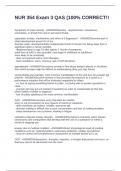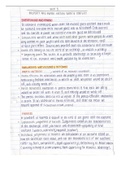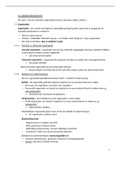Exam (elaborations)
NUR 354 Exam 3 QAS (100% CORRECT!!
- Course
- Institution
Symptoms of major anxiety - ANSWERSanxiety - apprehension, uneasiness, uncertainty, or dread from real or perceived threat. separation anxiety, manifestions and when is it diagnoses? - ANSWERSnormal part of infant development around 8-14 mo disorder when: developmentally innapropriate levels of...
[Show more]






